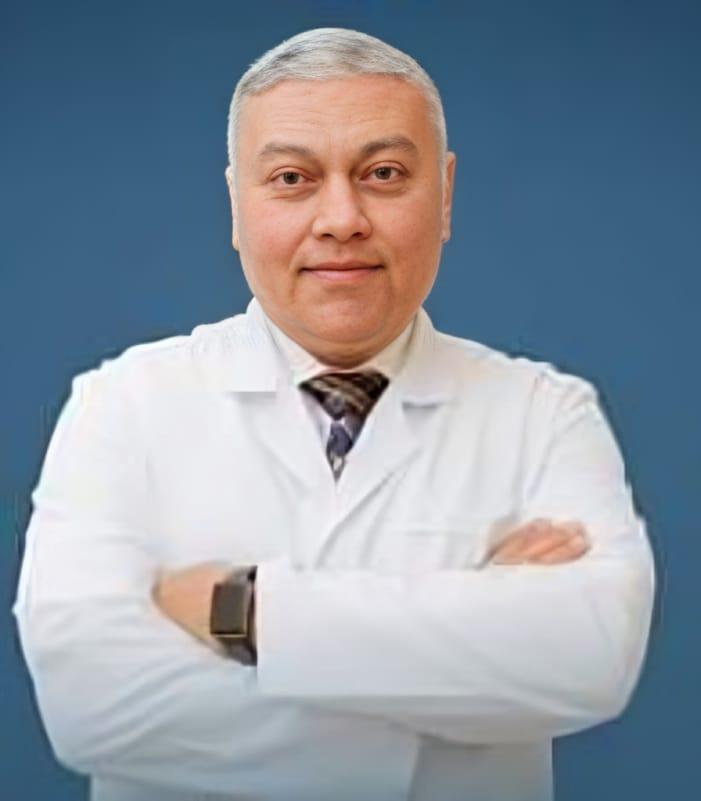Dr. Imad El-Sarawy
🏅 PhD in Heart and Coronary Artery Surgery
🩺 Assistant Professor of Heart and Coronary Artery Surgery, National Heart Institute, Nasser Institute, and Dar Al-Fouad Hospital.
Academic Qualifications:
🎓 PhD in Heart and Coronary Artery Surgery
🎓 Master’s in Heart Surgery
🩺 Specialized Training in Interventional Procedures and Advanced Heart Disease Treatment.
Specializations and Medical Services:
1. Heart and Vascular Diseases:
❤️ Coronary Artery Diseases: such as Angina Pectoris and Coronary Artery Insufficiency.
💉 Hypertension: both Arterial and Pulmonary.
💔 Heart Valve Diseases: such as Stenosis or Valvular Insufficiency.
🫣 Endocarditis (Infection of the Heart Lining).
💪 Cardiomegaly: caused by chronic diseases like Hypertension.
👩🦰 Heart Diseases in Women: Prevention and specialized treatment for women with specific heart conditions.
2. Arrhythmias:
⚡ Arrhythmias: such as Atrial Fibrillation or Ventricular Tachycardia.
💥 Angina and Atypical Chest Pain.
💔 Heart Failure: leading to Cardiac Weakness.
🔍 Early Detection of Heart Disease using advanced tests like Echo and ECG.
📝 Normal ECG
🏃♂️ Exercise ECG (Stress Test).
3. Advanced Diagnostic and Therapeutic Procedures:
💉 Coronary Angiography: to diagnose and treat coronary artery blockages.
💪 Radial Angiography: A modern, less painful method for the patient.
🔧 Angioplasty and Stent Insertion to open blocked arteries.
⚙️ Valvuloplasty: performed through a catheter for narrowed heart valves.
📊 Echo (Ultrasound of the Heart): to assess heart function and detect structural issues.
🕒 Holter ECG: Continuous heart monitoring for 24 hours.
4. Treatment of Complex Cardiac Conditions:
⚠️ Coronary Artery Insufficiency Treatment.
💔 Heart Failure Treatment: using medications and interventional therapies.
🩸 Cholesterol and Lipid Management.
💉 Treatment for Hypertension: both Arterial and Pulmonary.
🔪 Surgical Treatment for Complex Heart Cases: such as Coronary Artery Bypass or Valve Replacement surgeries.
5. Post-operative Care and Follow-up:
🔄 Post-Stent Insertion Follow-up.
🔄 Follow-up after Valve Replacement and Angioplasty.
🏥 Critical Care for Heart Patients in Intensive Care.
💓 ICU Care for Critical Cardiac Conditions.
6. Pediatric Cardiology:
👶 Assessment and Treatment of Pediatric Heart Diseases.
🔍 Post-surgery Follow-up for Children with Congenital Heart Diseases.
Clinic Location:
🏥 Private Clinic:
📍 96 Tahrir Street, Dokki Square, Giza.
📞 Phone Number:
📱 01227345248
Workplaces:
National Heart Institute: One of the largest medical centers specializing in heart surgery in Egypt.
Nasser Institute: A government hospital specializing in heart disease treatment.
Dar Al-Fouad Hospital: A leading private hospital in heart surgery.
Consultation and Specialized Treatment:
Dr. Imad El-Sarawy provides specialized consultations and tailored treatment for each case based on the latest medical methods in heart surgery and vascular surgery. He offers comprehensive medical care with close follow-up after medical procedures.

